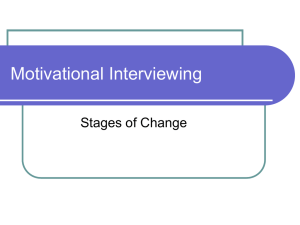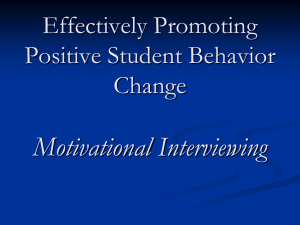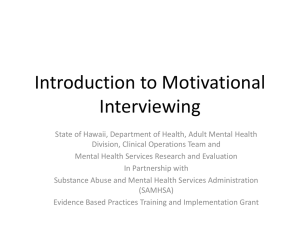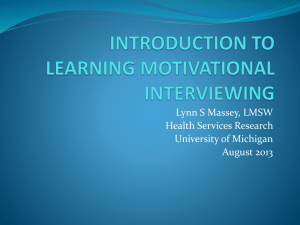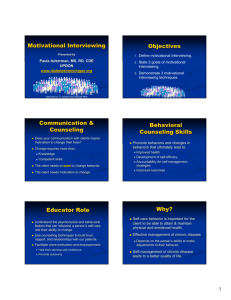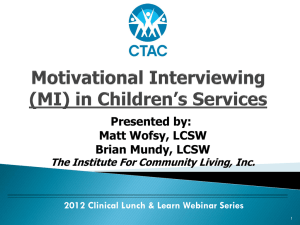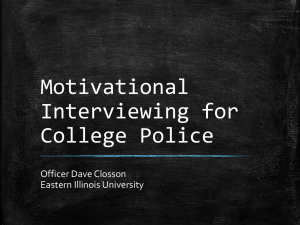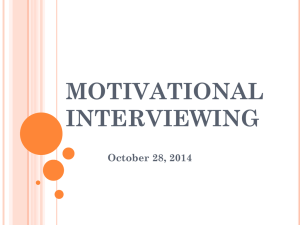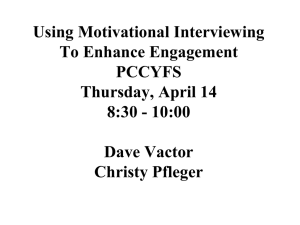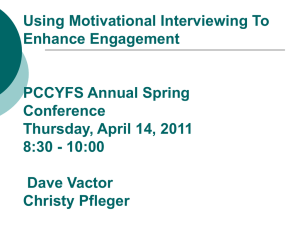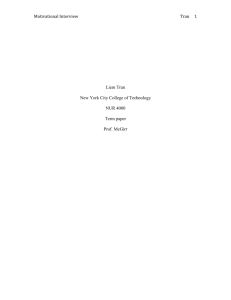Trainers Guide To Motivational Interviewing
advertisement
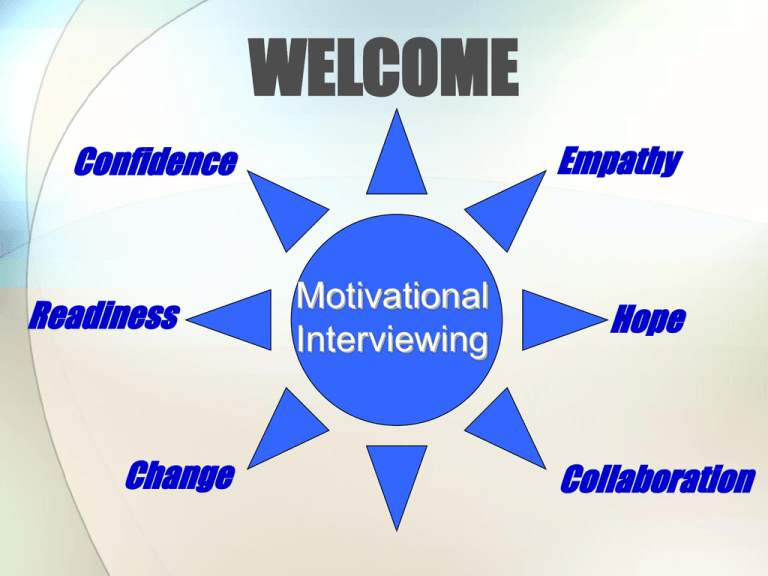
WELCOME Empathy Confidence Readiness Change Motivational Interviewing Hope Collaboration Housekeeping • Time Start Lunch End Breaks along the way • Location • Materials • Other? Workshop Goals • Discuss Stages of Change Theory. • Present Phases 1 and 2 of Motivational Interviewing. • Provide skill-building practice. • Address AI/AN cultural issues. • Discuss how to apply concepts within AI/AN treatment programs. Day One Agenda • Review basics of Stages of Change Theory. • Identify the components of MI Spirit. • Identify and practice Phase 1 skills and strategies. Integrate Indian cultural issues Day Two Agenda • Discuss and practice Change Talk. • Address Phase 2 skills and strategies. • Discuss beyond training needs for supervision. • Review fidelity scale issues. • Closure and evaluation. Common Factors Technique/Orientation The skills and counseling orientation. 15% Therapeutic Relationship The degree to which counseling conveys a nonjudgmental, empathic, accepting, warm environment. 30% Hope Expectancy The belief that one can change and will be successful at making changes. 15% Client Traits Their strengths, temperament, resources, and skills. 40% Participant Expectations • Turn to page 2 in Learner’s Manual. • Write one expectation you have for this training. • Form pairs and share your expectations with one another. • Share with the larger group. MI and Healing Generational trauma Attempts to destroy AI/AN cultures Alienation from tribal life, customs, and spiritual practices Internalized oppression Contrasting Cultural Values Western Culture Contrast Culture Individual Focus Self-Reliance • Group Focus • Interdependence Open & Direct Personal Achievement • Indirectness • Interpersonal Relations Importance of Doing Materialism • Importance of Being • Non-materialism Competition Cause & Effect Thinking • Cooperation • Relationship-Oriented Thinking Time is Future/Past Change Inevitable • Present • Change Upsetting Cultural Exercise • Divide into small groups of 3 or 4. • Discuss: 1. How you have adapted your counseling practices when working with Native Peoples. 2. Create a group newsprint sheet that shows those adaptations highlighting specific values, goals, and techniques. 3. Choose a spokesperson to report your group’s findings. MI & Contrast Cultural Values Listening…… Interdependence... Learning… Importance of Being... Respect… Cooperation… Relationship Thinking... Evaluation Motivational Interviewing Encourages respectful counselor-client relationship. Builds upon AI/AN cultural strengths. Aids in resolution of client values/ behavior discrepancies enabling balanced lives. Emphasizes consultation rather than confrontation. Honors clients’ ability to heal themselves by finding their path to balance, harmony, and health. Engages clients to collaborate in a healing process. Termination Action Preparation Precontemplation Maintenance Contemplation Stages of Change Prochaska et al, 1991 Healing MI Words Empowering Supporting Empathic Accepting STYLE Patient Respectful Understanding Nonjudgmental Termination Action Preparation Precontemplation Maintenance Contemplation Stages of Change Prochaska et al, 1991 Changes Not Ready Unsure Ready Change “There is no problem.” “There may be a problem, but I have mixed feelings.” “There is a “My change(s) problem and I are working want to for me now.” change.” Motivational Interviewing • • • • Directive Client-centered Counseling style Elicits behavior change • Client ambivalence • Communication style • Autonomy respected Fundamental Principals • Express Empathy • Develop Discrepancy • Roll with Resistance • Support Self-Efficacy Balance/Imbalance Motivational Interviewing (Review) • • • • Directive Client-centered Counseling style Elicits behavior change • Client ambivalence • Communication style • Autonomy respected Horse Whisperer Behaviors Healing MI Words Empowering Supporting Empathic Accepting STYLE Patient Respectful Understanding Nonjudgmental Motivational Interviewing PHASE 1: Building Motivation PHASE 2: Strengthening Commitment to Change MI Skills and Strategies Phase 1 Phase 2 • Open-Ended Questions • Recognizing Readiness • Affirmation • Transitional Summary • Reflective Listening • Key Question(s) • Summary • Information and Advice • Eliciting Change Talk • Negotiating Plans for Change Motivational Interviewing Phase 1 Strategies Open-Ended Questions Affirmation Reflective Listening Summary Eliciting Change Talk Open vs. Closed Questions • Open Requires more than a yes or no response Eliciting—more person-centered Aids individual cognitions • Closed Quick, easier, & efficient Less person-centered Less engaging Affirmations • Compliments. • Statement of appreciation. • Highlights client strengths. • Is a form of Reflective Listening. • Is client-focused. ROADBLOCKS • • • • • • Order, direct • Warn or threaten • Advise, suggest, solve • Persuade, argue, lecture • Moralize, preach, “shoulds” • Disagree, judge, blame • Agree, approve, praise Shame, ridicule, label Interpret, analyze Reassure, sympathize, console Question or probe Withdraw, distract, humor, change subject ROADBLOCKS EXERCISE • Seller—use Roadblocks • Customer—be ambivalent “just looking” Thomas Gordon Communication Model The words the speaker says The words the listener hears What the speaker really means What the listener thinks the speaker means What is Reflective Listening? • Hearing the meaning behind client words • Building hypothesis vs. making assumptions • A non-judgmental, accepting environment Thinking Reflectively • Speaker: If a relative of mine had permission to brag about me, would they say... _____________________________. • Listeners: Do you mean you ________________? • Speaker: Respond by saying ONLY yes or no Forming Reflections • Speaker: If a relative of mine had permission to brag about me, he or she would say . . . _____________________. • Listeners: It sounds like you . .. .You’re feeling .. . It seems to you that . .. . So you . . . . • Speaker: Can elaborate with a few more words, phrases or brief sentences. Reflective Listening Simple Repeat Rephrase Complex Paraphrase Reflection of Feelings Summary, Metaphors Summarizing • Special form of reflection. • Counselor chooses what to include and emphasize. • Include client’s concerns about change, problem recognition, optimism about change and ambivalence about change. • Let client know you are listening. • Invite client to respond to your summary. Practicing OARS • Speaker: Something in my life that is out of balance right now is: ______________________. • Listener: Practices OARS • Observer: Keeps track for Listener • Switch roles and repeat Change Talk Categories (Self-Motivational Statements) • Advantages of change • Disadvantages of status quo • Optimism for change • Intention to change • Commitment MI Change Talk Strategy Process Asking for Clients DESIRES Assessing Seeing Behavior Change ABILITIES REASONS Strengthen Client Commitment Talk Hearing Strong Commitment Talk NEEDS Client Behavioral Change Change Talk Strategies • Evocative Question • Decisional Balance Desires, Ability, Reasons, Needs & Commitment for Change (DARN-C) • Looking Forward– Looking Back • Elaboration • Importance Confidence Rulers • Exploring Goals and Values Phase 1 Traps • • • • • Question/Answer Trap Taking Sides Expert/Labeling Premature Focus Blaming OARS and Change Talk • Open-ended questions • Affirmation • Reflective Listening • Summary • Eliciting change talk • Evocative question • Elaboration • Important Confidence rulers • Decisional balance • Looking forward— looking back • Exploring goals and values MI Fidelity Issues MI Treatment Integrity Scale (MITI)* • Global Therapist Ratings Beginner 5 Competent 6 • Reflection to Question Ratio Beginner (1:1) Competent (2:1) • Percent Open Questions Beginner 50% Competent 70% • Percent Complex Reflections Beginner 40% Competent 50% • Percent MI –Adherent Beginner 90% Competent 100% *from Moyers, Martin, Manuel, & Miller, 2004 Client Resistance Involves feelings, actions, and behaviors of an interpersonal nature where there is a lack of collaboration. Balance/Imbalance Resistant Behaviors • Arguing • Denying • Blaming • Interrupting • Taking over • Not responding Reflective Responses •Simple •Amplified •Double-Sided Strategic Responses • Shifting focus • Reframing • Agreement with a twist • Siding with the negative • Emphasizing personal choice • Support self-efficacy Reflective & Strategic Responses to Resistance • Shifting focus • Agreement with a twist • Emphasizing personal choice Simple Amplified • Reframing • Siding with the negative • Support self-efficacy Double-Sided Assessing Readiness Ready, Willing and Able Summary • Motivational interventions. • Strategies to enhance motivation. • Handling resistance. Phase 2 Strategies Recognizing Readiness Transitional Summary Key Questions Information and Advice Negotiating Plans for Change Change Plan Elements • Negotiating the plan • Identify barriers to change • Implement • Enlisting social support • Outcome measures • Measures of success Decisional Balance Balance and Harmony Decisions Harmony Ambivalence and Disharmony Phase 2 Hazards • Underestimating Ambivalence • Over Prescription • Insufficient Direction Workshop Goals • Discuss Stages of Change Theory. • Present Phases 1 and 2 of Motivational Interviewing. • Provide skill-building practice. • Address AI/AN cultural issues. • Discuss how to apply concepts within AI/AN treatment programs.
